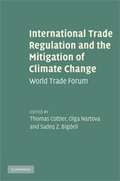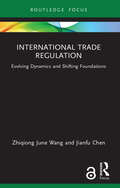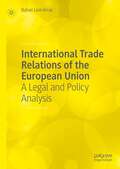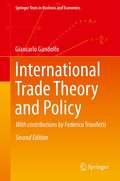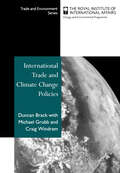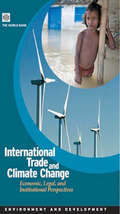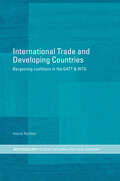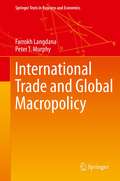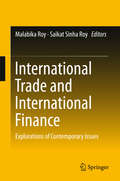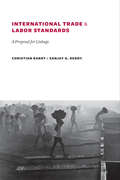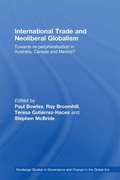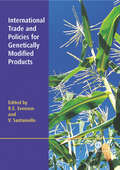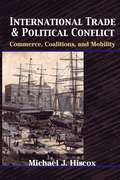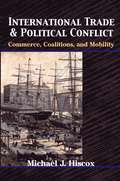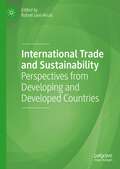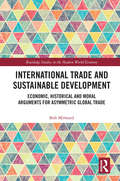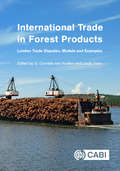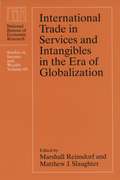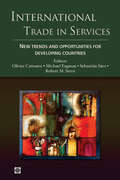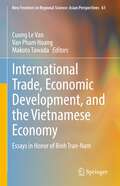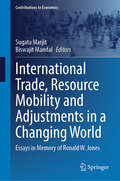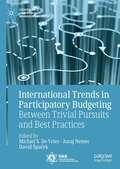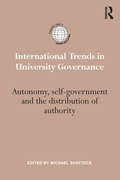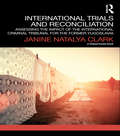- Table View
- List View
International Trade Regulation and the Mitigation of Climate Change
by Thomas Cottier Olga Nartova Sadeq Z. BigdeliWhat can trade regulation contribute towards ameliorating the GHG emissions and reducing their concentrations in the atmosphere? This collection of essays analyses options for climate-change mitigation through the lens of the trade lawyer. By examining international law, and in particular the relevant WTO agreements, the authors address the areas of potential conflict between international trade law and international law on climate mitigation and, where possible, suggest ways to strengthen mutual supportiveness between the two regimes. They do so taking into account the drivers of human-induced climate change in energy markets and of consumption.
International Trade Regulation: Evolving Dynamics and Shifting Foundations (Routledge Research in International Economic Law)
by Zhiqiong June Wang Jianfu ChenThe international trade regulatory system is a dynamic system that has been evolving throughout its history. Tension and conflict are part of the system. While calls for the abolition of the principal trade regulation authority, the WTO, have failed to understand this nature of the system, proponents for reforms have so far not paid sufficient attention to the evolving nature of tension and conflict. This book examines the evolving dynamics in international trade regulation from the conclusion of GATT in 1947 to the current crisis facing the WTO, from a perspective of emerging powers of developing countries with a focus of China as the latest force that demands reforms of the international trade regulatory regime. There is an extensive body of scholarship on ideological struggles, the rise of developing countries, geopolitical contest, the emerging powers (especially China), the use, misuse or abuse of trading rules and so on. There is, however, a lack of a single concise research book that synthesises these underlying causes and factors into a coherent and precise analytical theme. This book attempts to fill this research gap by building upon the existing scholarship and placing the various tensions and conflicts in a perspective that treats them as dynamic factors that have propelled a continuing process of evolution of the international trade regulation. The book will interest those researching on international trade regulation as well as development studies.
International Trade Relations of the European Union: A Legal and Policy Analysis
by Rafael Leal-ArcasThis book examines the need for greater legal coherence within international trade negotiations between the European Union (EU) and external trade relations. An introspective analysis of EU trade law and policy is presented that highlights the complex issue of EU unity. A particular focus is given to the Doha Round and the General Agreement on Trade in Services, with empirical analysis placing the negotiations not just within the context of international trade law, but also within broader social and political contexts. This book aims to provide an interdisciplinary understanding of the EU’s international trade negotiations. It will be relevant to researchers and policy-makers interested in international trade and EU law.
International Trade Theory and Policy
by Federico Trionfetti Giancarlo GandolfoIn the present text the author deals with both conventional and new approaches to trade theory and policy, treating all important research topics in international economics and clarifying their mathematical intricacies. The textbook is intended for undergraduates, graduates and researchers alike. It addresses undergraduate students with extremely clear language and illustrations, making even the most complex trade models accessible. In the appendices, graduate students and researchers will find self-contained treatments in mathematical terms. The new edition has been thoroughly revised and updated to reflect the latest research on international trade.
International Trade and Climate Change Policies
by Duncan Brack with Michael Grubb and Craig WindramFocusing on the likely impacts on trade of the UN Framework Convention on Climate Change and the Kyoto Protocol, this book examines the actual and potential conflicts between whether liberalization of trade undermines the efforts of industrialised countries to mitigate climate change. It will be essential reading for environmental economists and those engaged in international environmental relations and policy.
International Trade and Climate Change: Economic, Legal, and Institutional Perspectives
by World BankClimate change remains a global challenge requiring international collaborative action. Another area where countries have successfully committed to a long-term multilateral resolution is the liberalization of international trade. Integration into the world economy has proven a powerful means for countries to promote economic growth, development, and poverty reduction. The broad objectives of the betterment of current and future human welfare are shared by both global trade and climate regimes. Yet both climate and trade agendas have evolved largely independently through the years, despite their mutually supporting objectives. Since global emission goals and global trade objectives are shared policy objectives of most countries, and nearly all of the World Bank's clients, it makes sense to consider the two sets of objectives together. This book is one of the first comprehensive attempts to look at the synergies between climate change and trade objectives from economic, legal, and institutional perspectives. It addresses an important policy question - how changes in trade policies and international cooperation on trade policies can help address global environmental spillovers, especially GHG emissions, and what the (potential) effects of (national) environmental policies that are aimed at global environmental problems might be for trade and investment. It explores opportunities for aligning development and energy policies in such a way that they could stimulate production, trade, and investment in cleaner technology options.
International Trade and Developing Countries: Bargaining Coalitions in GATT and WTO (RIPE Series in Global Political Economy)
by Amrita NarlikarA keen analysis of how and why countries bargain together in groups in world affairs, and why such coalitions are crucial to individual developing nations. It also reveals the effects these negotiating blocs are having on world affairs. Successful coalition building has proven to be a difficult and expensive process. Allies are often not obvious and need to be carefully identified. Large numbers do not necessarily entail a proportionate increase in influence. And the weak have the choice of teaming up against or jumping on the bandwagon with the strong. Even after it has been organised, collective action entails costs of many kinds. This book investigates the relevance and workability of coalitions as instruments of bargaining power for the weak. More specifically, this analyzes the coalition strategies of developing countries at the inter-state level, particularly in the context of international trade. Given the nature of this enquiry, this new study uses theoretical and empirical methods to complement each other. The theoretical approach draws from a plethora of writings: formal theories of clubs and coalitions, theories of domestic political economy and theories of international relations. The empirical analysis of comparable coalitions becomes necessary to assist in this theorising, so the greater part of the book focuses mainly (though not exclusively) on coalitions involving developing countries on the issue-area of trade in services. Through the case-studies of the Uruguay Round and an analytical overview of more recent coalitions, this text fills an important gap in the literature of international political economy and international relations where most GATT/WTO-based coalitions have eluded record. This book will be of great interest to all students of international relations, politics and globalization.
International Trade and Global Civil Society
by Dev Nathan D Narasimha Reddy Govind KelkarThis study challenges the dominant tendency of civil society to negate international trade as such. The authors argue that it is necessary to frame differentiated trade rules based on levels of economic development, and also to shift from subsidies to shore up uncompetitive livelihoods to productivity-enhancing investments.Most importantly, the book ends with a case for trade unions, women's organizations and other civil society organizations to imagine and create themselves as being global -- in order to take up the challenge of strengthening global countervailing power to capital.
International Trade and Global Macropolicy
by Farrokh Langdana Peter T. MurphyIn the curricula of highly ranked MBA programs, two areas of discussion are conspicuously absent: International Trade, and Global Macroeconomic Policy. In this post-financial crisis environment, as the US and other advanced economies continue to experience sluggish growth, persistently high unemployment, and political agitation for increasingly protectionist policies, discussions pertaining to trade, currencies, and international capital flows are often fraught with emotion, tension, and hysteria. This book cuts through the emotions and superficial "solutions" and provides the reader with a thorough understanding of the hard-hitting theoretical models that drive the global flow of goods, services, and capital in the real world. A key feature of this volume is the presentation of the theoretical models, and the discussion of their implications in the context of real-world applications. This text is uniquely designed for current and future business leaders who are, or will be, engaged in the global economy. Armed with an understanding of the theoretical underpinnings driving goods, capital and ideas across national boundaries, readers will learn to anticipate the effects of trade and macroeconomic policy changes, and will have the tools to make sound, informed decisions for themselves and their global organizations.
International Trade and International Finance
by Malabika Roy Saikat Sinha RoyThis book brings together a collection of papers on international trade and international finance, instead of treating the two as disjoint fields of study. The volume, while focusing on the recent developments and frontiers of research in international trade and international finance, also emphasizes the inherent integrated nature of the two subjects; some of the papers are overlapping across the two areas. A unique feature of the proposed volume is that it unravels some new issues in addition to re-examining certain old issues in a new perspective and thus covers wide ranging issues with an emphasis on policy. The book covers issues mostly relating to emerging market economies, which has increasingly assumed importance in the context of globalization. The book contains some survey papers covering the frontiers of current knowledge on important themes like recent developments in trade theory and empirics, foreign exchange market, institutions in trade and finance, interrelation and interaction between international trade and international finance. The papers, fruit of rigorous and original research, are written by internationally and nationally reputed authors along with promising young researchers on the subjects. The book substantially contributes to the growing literature on issues relating to trade and international finance in emerging market economies and extends the frontiers of knowledge. The book is expected to have the widest possible readership comprising of advanced undergraduate and graduate students as well as senior researchers working in international trade and international finance.
International Trade and Labor Standards: A Proposal for Linkage
by Christian Barry Sanjay ReddyProgressive governments in poor countries fear that if they undertake measures to enhance real wages and working conditions, rising labor costs would cause wealthier countries to import from and invest elsewhere. Yet if the world trading system were designed to facilitate or even reward measures to promote labor standards, poor countries could undertake them without fear.In this book, Christian Barry and Sanjay G. Reddy propose ways in which the international trading system can support poor countries in promoting the well-being of their peoples. Reforms to the trading system can lessen the collective-action problem among poor countries, increasing their freedom to pursue policy that better serves the interests of their people. Incorporating the right kind of linkage between trading opportunities and the promotion of labor standards could empower countries, allowing them greater effective sovereignty and enabling them to improve the circumstances of the less advantaged. Barry and Reddy demonstrate how linkage can be made acceptable to all players, and they carefully defend these ideas against those who might initially disagree. Their volume is accessible to general readers but draws on sophisticated economic and philosophical arguments and includes responses from leading labor activists, economists, and philosophers, including Kyle Bagwell, Robert Goodin, Rohini Hensman, and Roberto Mangabeira Unger.
International Trade and Neoliberal Globalism: Towards Re-peripheralisation in Australia, Canada and Mexico? (Routledge Studies in Governance and Change in the Global Era)
by Paul Bowles Ray Broomhill Teresa Gutiérrez-Haces Stephen McBridInternational trade must be analysed within the historical context within which it occurs. Behind the statistics on trade flows lie power structures, class interests and international hierarchies. These change over time and how countries respond to them has critical implications for their citizen’s well-being. In this book, the history of trade in Australia, Canada and Mexico is analysed. Trade agreements are analysed in detail to explore the new forms that dependence and subordination have taken. Arguing that the free trade agreements are significantly biased in favour of the United States, the contributors analyse how each of the three countries are being subject to specific forms of re-peripheralisation and examine possible alternatives for a progressive future based on an integration in the global economy which enhances, rather than limits, democracy and social justice. By providing an historical and critical account of trade policy in the three countries, the book provides a welcome antidote to the ahistorical accounts of free trade supporters.
International Trade and Policies for Genetically Modified Products
by Vittorio Santaniello Robert E. EvensonThere are a number of controversial issues that surround agricultural biotechnology and genetically modified products. International trade and policies are at the forefront of these controversies. This book addresses these issues and has been developed from a meeting of the International Consortium on Agricultural Biotechnology Research, held in Revello, Italy, in July 2004. It covers five themes: analytical studies, empirical trade studies, spillover dimensions, intellectual property rights and applied general equilibrium trade models.
International Trade and Political Conflict: Commerce, Coalitions, and Mobility
by Michael J. HiscoxThis book unveils a potent new approach to one of the oldest debates in political economy--that over whether class conflict or group competition is more prevalent in politics. It outlines the conditions under which one type of political conflict is more likely than the other. It focuses on a critical issue affecting support for and opposition to free trade--factor mobility, or the ability of those who own a factor of production (land, labor, or capital) to move it from one industry to another.
International Trade and Political Conflict: Commerce, Coalitions, and Mobility
by Michael J. HiscoxThis book unveils a potent new approach to one of the oldest debates in political economy--that over whether class conflict or group competition is more prevalent in politics. It goes further than any study to date by outlining the conditions under which one type of political conflict is more likely than the other. Michael Hiscox focuses on a critical issue affecting support for and opposition to free trade--factor mobility, or the ability of those who own a factor of production (land, labor, or capital) to move it from one industry to another. He argues that the types of political coalitions that form in trade politics depend largely on the extent to which factors are mobile between industries. Class coalitions are more likely where factor mobility is high, Hiscox demonstrates, whereas narrow, industry-based coalitions predominate where it is low. The book also breaks new ground by backing up the theory it advances with systematic evidence from the history of trade politics in six nations over the last two centuries, using a combination of case studies and quantitative analysis. It makes fresh conclusions about the forces shaping trade policy outcomes--conclusions that yield surprising insights into the likely evolution of the global trading system and U.S. trade policy in particular. International Trade and Political Conflict is a major contribution to the scholarly literature while being accessible to anyone interested in understanding and predicting developments in trade policy.
International Trade and Sustainability: Perspectives from Developing and Developed Countries
by Rafael Leal-ArcasThis book examines how international trade can be utilised to build a sustainable future. It highlights how international trade and climate regimes can work together to put in place a Green New Deal. The potential of mega-regional trade agreements to aid climate change mitigation and power the energy transition is explored in relation to the energy section, with a particular focus on clean technology. Broader perspectives are provided by an analysis of international trading systems in the Caribbean and Pacific Islands and a review of climate change law and policy in Brazil, Russia, India, and China. This book aims to provide an interdisciplinary understanding of how green trade can be achieved. It will be relevant to researchers and policymakers interested in international trade and environmental economics.
International Trade and Sustainable Development: Economic, Historical and Moral Arguments for Asymmetric Global Trade (Routledge Studies in the Modern World Economy)
by Bob MilwardThe contemporary orthodox view of world trade has centred, generally unchallenged, on the ideas of free trade, based on the theoretical construct of comparative advantage. This book will engage in a critique of the orthodox position based on the underlying theoretical economic construct, the historical development of the now developed economies and the morally unsustainable position of the free-trade regime. The author examines alternatives such as Most Favoured Nation and Preferential Trading Agreements before making the argument in favour of Asymmetric Trading, where the underdeveloped economies can develop behind tariff barriers and quotas, whilst the triadic nations maintain a lack of barriers to the exports of these economies. He outlines how such a trading regime would be mutually beneficial in the long term, in the sense that development through industrialisation takes place and the increase in GDP per capita would allow markets for exports to be sustainable, thus widening the market for the goods and services of the developed economies. However, the author demonstrates that free trade actually increases the development gap by maintaining the status quo in terms of the underdeveloped economies specialising in and exporting low value-added primary products and importing high value-added manufactures. The book analyses contemporary and historical data to illustrate how an alternative trading regime can be truly advantageous to both the developed and underdeveloped regions of the world: a global trading regime that is capable of increasing GDP in a sustainable manner without transferring a surplus from the poor to the rich nations and without a long-term commitment on the part of the developed nations to altruism.
International Trade in Forest Products: Lumber Trade Disputes, Models and Examples
by Craig Johnston Harry Nelson Joseph Buongiorno Jinggang Guo Xintong Li Fatemeh Mokhtarzadeh Prakash Nepal Jeffrey Prestemon Brad StennesBecause of the long-standing Canada-U.S. lumber trade dispute and the current pressure on the world's forests as a renewable energy source, much attention has been directed toward the modelling of international trade in wood products. Two types of trade models are described in this book: one is rooted in economic theory and mathematical programming, and the other consists of two econometric/statistical models--a gravity model rooted in theory and an approach known as GVAR that relies on time series analyses. The purpose of the book is to provide the background theory behind models and facilitate readers in easily constructing their own models to analyse policy questions that they wish to address, whether in forestry or some other sector. Examples in the book are meant to illustrate how models can be used to say something about a variety of issues, including identification of the gains and losses to various players in the North American softwood lumber business, and the potential for redirecting sales of lumber to countries outside the United States. The discussion is expanded to include other products besides lumber, and used to examine, for example, the effects of log export restrictions by one nation on all other forestry jurisdictions, the impacts of climate policies as they relate to the global forest sector, and the impact of oil prices on forest product markets throughout the world. This book will appeal to practising economists and researchers who wish to examine various policies that affect international trade, whether their interest is local or international in scope. Because the book provides the theoretical bases underlying various models, students and practitioners will find this a valuable reference book or supplementary textbook.
International Trade in Services and Intangibles in the Era of Globalization
by Marshall Reinsdorf Matthew J. SlaughterThe celebrated economist Zvi Griliches's entire career can be viewed as an attempt to advance the cause of accuracy in economic measurement. Hard-to-Measure Goods and Services, a collection of papers from an NBER conference held in Griliches's honor, is a tribute to his many contributions to current economic thought. Here, leading scholars of economic measurement address issues in the areas of productivity, price hedonics, capital measurement, diffusion of new technologies, and output and price measurement in "hard-to-measure" sectors of the economy.
International Trade in Services: New Trends and Opportunities for Developing Countries
by Olivier Cattaneo Robert M. Stern Sebastián Sáez Michael EngmanThe services sector is key to economic growth, competitiveness, and poverty alleviation. Comprising more than two-thirds of the world economy, services are now commonly traded across borders, helped by technological progress and the increased mobility of persons. In recent years, a number of developing countries have looked at trade in services as a means to both respond to domestic supply shortages and to diversify and boost exports. Any country can tap into the trade potential of services, but not every country can become a services hub across sectors. The opening of the services sector potentially comes with large benefits, but also fears and costs that should not be overlooked. This book provides useful guidelines for the assessment of a country's trade potential, and a roadmap for successful opening and export promotion in select services sectors. It looks at both the effects of increased imports and exports, and provides concrete examples of developing country approaches that have either succeeded or failed to maximize the benefits and minimize the risks of opening. It focuses on sectors that have been rarely analyzed through the trade lens, and/or have a fast growing trade potential for developing countries. These sectors are: accounting, construction, distribution, engineering, environmental, health, information technology, and legal services. This book is designed for non-trade specialists to understand how trade can help improve access to key services in developing countries, and for trade specialists to understand the specific characteristics of each individual sector. It will be a useful tool for governments to design successful trade opening or promotion strategies, and for the private sector and consumers to advocate sound domestic policy reforms accompanying an offensive trade agenda.
International Trade, Economic Development, and the Vietnamese Economy: Essays in Honor of Binh Tran-Nam (New Frontiers in Regional Science: Asian Perspectives #61)
by Makoto Tawada Cuong Le Van Van Pham HoangThis volume spotlights some of the most important economic issues confronting today's emerging developing countries. The topics studied in the book include the importance of productivity to economic growth, international trade and its relationship to productivity; immigration and brain drain; pollution havens, climate change, and the carbon tax; the effectiveness of foreign aid, the efficiency of education, and governance. Written by some of the most respected scholars in their respective fields, the individual chapters apply both economic theory and the most current empirical tools in rigorous but accessible exposition. Researchers can find value in the modeling and empirical techniques that can be applied to other countries and datasets. Policy makers can benefit from the intellectual foundation on which decisions on important issues can be based; and students of international trade, economic development, and environmental economics can gain knowledge of different country settings that give context to their fields of study.
International Trade, Resource Mobility and Adjustments in a Changing World: Essays in Memory of Ronald W. Jones (Contributions to Economics)
by Sugata Marjit Biswajit MandalThis volume mainly focuses on the relevance and application of Heckscher-Ohlin Model and Specific Factors Model of trade, while also addressing other latest global issues which are connected with two most celebrated structures of trade models developed by the legendary trade theorist Prof. Ronald Winthrop Jones. The two models were published as 'The Structure of Simple General Equilibrium Models' (1965) and 'A Three Factor Model in Theory, Trade and History' (1971). Both the structures are used extensively by trade economists and development economists to decipher a bunch of interesting and intertwined ideas. The models being easy to follow, are capable of explaining some contemporary global concerns if modified judiciously. This includes both theory and policy in both competitive and imperfectly competitive markets. It also has some empirical dimensions. This book is a must read for those who want to keep abreast of latest frontiers in the domain of research on internationaltrade theory and policy, especially advanced graduate students, researchers, and policy makers in general. It exposes its readers to methodological techniques and contemporary research issues so that one can easily draw clues, in terms of both relevant techniques and future research directions, to carry on their own research; policy makers can understand the channels of possible welfare improvement owing to new policy changes.
International Trends in Participatory Budgeting: Between Trivial Pursuits and Best Practices (Governance and Public Management)
by Michiel S. De Vries Juraj Nemec David ŠpačekThis book analyses the participatory budgeting practice as it has evolved in evaluated countries, focusing on what is substantially at stake concerning the budget and issues involved, the actual participation, the way such processes are organised and administered, and the outcomes of such processes. It concludes that participatory budgeting in selected European countries is far away from the level of ‘best practice’, but that all experiences are not just trivial pursuits. The information collected serves to check, to what extent participatory budgeting as practiced in the countries involved presents a real attempt to change municipal budgets towards addressing the needs of marginalized groups and to improve decision-making based on local democracy and participation, or whether these processes as such are to be judged to be more important than any output and outcomes. The practices can neither be seen as a process of policy diffusion nor as a process of policy mimesis. The terminology of participatory budgeting remains, but the tools to achieve the goals resulted only in marginal changes in the status quo in municipalities in European countries practicing participatory budgeting, instead of resulting in radical changes to increase spending in favor of marginalized groups.Chapter 15 'Unraveled Practices of Participatory Budgeting in European Democracies' is available open access under a CC BY 4.0 license.
International Trends in University Governance: Autonomy, self-government and the distribution of authority (International Studies in Higher Education)
by Michael ShattockGovernance is becoming increasingly important in universities just as it is in the wider world of commerce and banking. Historically, universities were run by their academic communities but as mass higher education has taken root, as university research has become a critical element in national economies and as the demand for more accountability both financial and in academic performance has grown, pressure has mounted for a ‘modernisation’ of governance structures. One aspect of ‘modernisation’, particularly important in many European systems, and in Japan, has been the decision by governments to give institutions greater autonomy, more control over their budgets and legal responsibility for the employment of their staff. International trends to introduce greater competition between institutions, to encourage greater institutional differentiation and give greater play to market forces has led to an emphasis on leadership, a more systematic involvement of external stakeholders and a more ‘corporate style of governance. At the same time this has often led to a sense of loss of collegiality, a redistribution of authority and a growing gap between the ‘centre’ and the ‘periphery’ within universities. This book analyses governance change in nine major higher education systems, Australia, Finland, France, Germany, Italy, Japan, Norway, the UK and the USA, each account being the result of independent research by a leading authority in the field and describes how a convergence of governance structures has been mediated by the historical, cultural, political and social characteristics of the different systems. Michael Shattock is a leading authority on university governance; this study offers the most up to date account of governance reform in a range of higher education systems, an analysis of the common trends and an assessment of their impact on the idea of a university. It will be essential reading for academics, postgraduates and practitioners in higher education.
International Trials and Reconciliation: Assessing the Impact of the International Criminal Tribunal for the Former Yugoslavia
by Janine Natalya ClarkTransitional justice is a burgeoning field of scholarly inquiry. Yet while the transitional justice literature is replete with claims about the benefits of criminal trials, too often these claims lack an empirical basis and hence remain unproven. While there has been much discussion about whether criminal trials can aid reconciliation, the extent to which they actually do so in practice remains under-explored. This book investigates the relationship between criminal trials and reconciliation, through a particular focus on the International Criminal Tribunal for the former Yugoslavia (ICTY). Using detailed empirical data – in the form of qualitative interviews and observations from five years of fieldwork – to assess and analyze the ICTY’s impact on reconciliation in Bosnia-Hercegovina, Croatia and Kosovo, International Trials and Reconciliation: Assessing the Impact of the International Criminal Tribunal for the former Yugoslavia argues that reconciliation is not a realistic aim for a criminal court. They are, Janine Clark argues, only one part of a rich tapestry of justice, which must also include non-retributive transitional justice processes and mechanisms. Challenging many of the common yet untested assumptions about the benefits of criminal trials, this innovative and extremely timely monograph will be invaluable for those with interests in the theory and practice of transitional justice.
